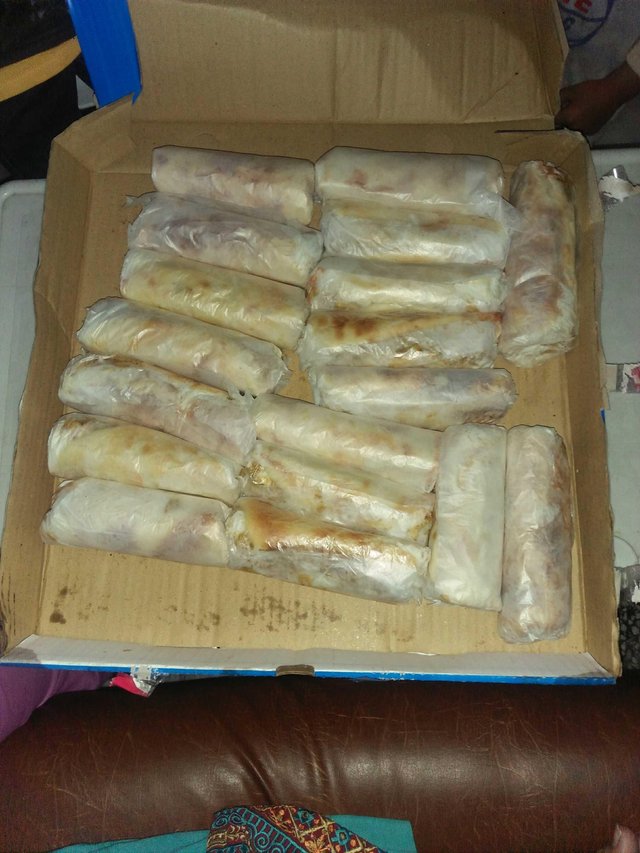Chicken shawarma
 Shawarma (Arabic: شاورما) also spelled shawurma or shawerma, is a Levantine meat preparation, where lamb, chicken, turkey, beef, veal, or mixed meats are placed on a spit (commonly a vertical spit in restaurants), and may be grilled for as long as a day.[2][3] Shavings are cut off the block of meat for serving, and the remainder of the block of meat is kept heated on the rotating spit. Shawarma can be served on a plate (generally with accompaniments), or as a sandwich or wrap. Shawarma is usually eaten with tabbouleh, fattoush, taboon bread, tomato, and cucumber. Toppings include tahini, hummus, pickled turnips, and amba. Shawarma is one of the world's most popular street foods, especially in the countries of the Levant and the Arabian Peninsula.[4]
Shawarma (Arabic: شاورما) also spelled shawurma or shawerma, is a Levantine meat preparation, where lamb, chicken, turkey, beef, veal, or mixed meats are placed on a spit (commonly a vertical spit in restaurants), and may be grilled for as long as a day.[2][3] Shavings are cut off the block of meat for serving, and the remainder of the block of meat is kept heated on the rotating spit. Shawarma can be served on a plate (generally with accompaniments), or as a sandwich or wrap. Shawarma is usually eaten with tabbouleh, fattoush, taboon bread, tomato, and cucumber. Toppings include tahini, hummus, pickled turnips, and amba. Shawarma is one of the world's most popular street foods, especially in the countries of the Levant and the Arabian Peninsula.[4]
Shawarma
Shawarma (2223426004).jpg
Type
Meat
Place of origin
Ottoman Empire[1]
Region or state
Middle East, Levant
Main ingredients
Meat: lamb, chicken, turkey, beef
Sandwich: Shawarma meat or shawarma falafel, pita or wrap bread, chopped or shredded vegetables, pickles and assorted condiments
Cookbook: Shawarma Media: Shawarma
Related dishes in the region include Turkish döner kebab and Greek gyros.[5]
History Edit
Grilling a vertical spit of stacked meat slices and cutting it off as it cooks was developed in the 19th century in Ottoman Turkey.[6][7] This is döner kebab, which is the origin of shawarma, Mexican tacos al pastor, and Greek gyros.
Etymology Edit
Shawarma is an Arabic rendering of Turkish çevirme [tʃeviɾˈme] 'turning', referring to the turning rotisserie.[8] The Turkish and Greek names, döner and gyros, similarly refer to turning.
In popular media Edit
Towards the end of the 2012 superhero film The Avengers, after the group's battle with the Chitauri army, Iron Man expresses his desire to eat shawarma to celebrate. In the post-credit scene, the titular group is seen tiredly eating shawarma at a local eatery in New York City.[9] According to TMZ this led to a temporary boost in shawarma sales in Los Angeles when the movies opened
Shawarma (Arabic: شاورما) also spelled shawurma or shawerma, is a Levantine meat preparation, where lamb, chicken, turkey, beef, veal, or mixed meats are placed on a spit (commonly a vertical spit in restaurants), and may be grilled for as long as a day.[2][3] Shavings are cut off the block of meat for serving, and the remainder of the block of meat is kept heated on the rotating spit. Shawarma can be served on a plate (generally with accompaniments), or as a sandwich or wrap. Shawarma is usually eaten with tabbouleh, fattoush, taboon bread, tomato, and cucumber. Toppings include tahini, hummus, pickled turnips, and amba. Shawarma is one of the world's most popular street foods, especially in the countries of the Levant and the Arabian Peninsula.[4]
Shawarma
Shawarma (2223426004).jpg
Type
Meat
Place of origin
Ottoman Empire[1]
Region or state
Middle East, Levant
Main ingredients
Meat: lamb, chicken, turkey, beef
Sandwich: Shawarma meat or shawarma falafel, pita or wrap bread, chopped or shredded vegetables, pickles and assorted condiments
Cookbook: Shawarma Media: Shawarma
Related dishes in the region include Turkish döner kebab and Greek gyros.[5]
History Edit
Grilling a vertical spit of stacked meat slices and cutting it off as it cooks was developed in the 19th century in Ottoman Turkey.[6][7] This is döner kebab, which is the origin of shawarma, Mexican tacos al pastor, and Greek gyros.
Etymology Edit
Shawarma is an Arabic rendering of Turkish çevirme [tʃeviɾˈme] 'turning', referring to the turning rotisserie.[8] The Turkish and Greek names, döner and gyros, similarly refer to turning.
In popular media Edit
Towards the end of the 2012 superhero film The Avengers, after the group's battle with the Chitauri army, Iron Man expresses his desire to eat shawarma to celebrate. In the post-credit scene, the titular group is seen tiredly eating shawarma at a local eatery in New York City.[9] According to TMZ this led to a temporary boost in shawarma sales in Los Angeles when the movies opened
exchange follow votes steemit steem